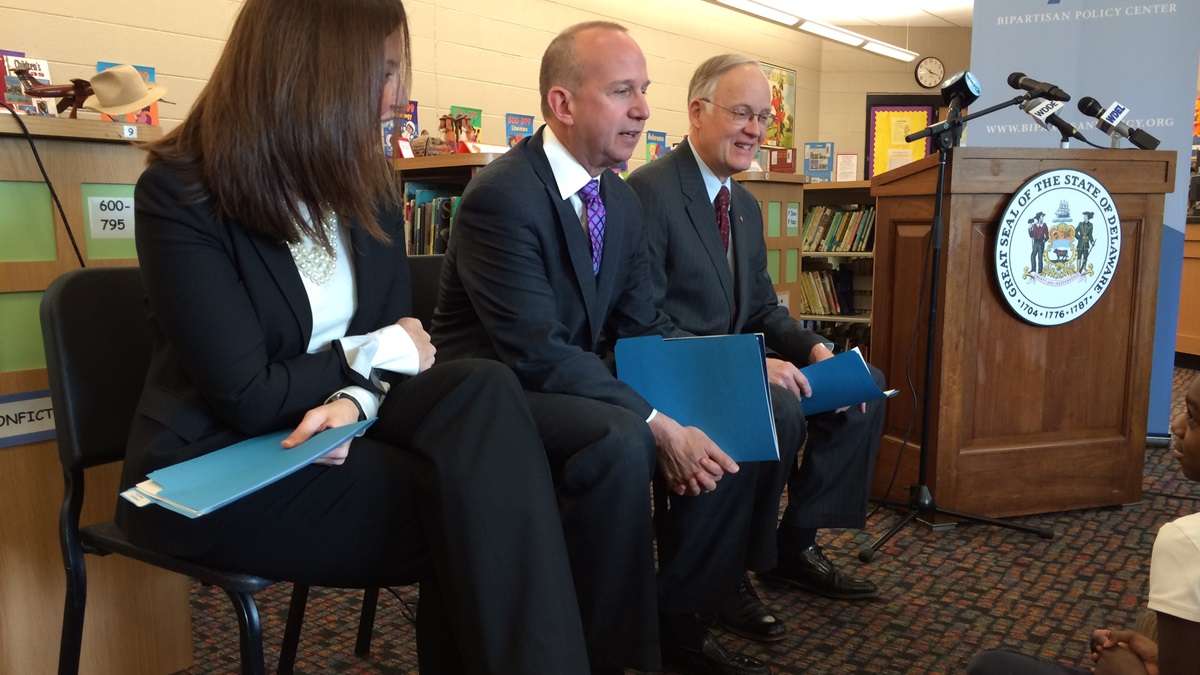Delaware launches partnership to support Common Core [audio]
ListenGrowing opposition against the implementation of Common Core State Standards has prompted Delaware Governor Jack Markell to take action.
Common Core is a nationwide educational standardization initiative that encompasses English, reading, writing and math. It dates to 2009, when the National Governors Association called on teachers and academic experts to develop standards that are considered more rigorous and competitive.
So far, 45 states have adopted CCSS, including Delaware, but Markell, who served as co-chair of the Common Core effort with the NGA, said that the effort is losing momentum because of the “mythology” surrounding the initiative.
“What we didn’t expect was a lot of misinformation that would be spread around the country about what these standards are,” Markell said.
Supporting higher standards
Along with former Vermont Governor Jim Douglas, a Republican and representative for the Bipartisan Policy Center Governor’s Council, and Cheryl Oldham, executive vice president of the U.S. Chamber of Commerce, Markell launched an effort to challenge some of the claims against CCSS.
He made the announcement on Monday after sitting in on a first grade reading class and fifth grade math class at Lancashire Elementary School in Wilmington. Considered early adopters of the standards, Lancashire started implementing Common Core in 2011.
“This is not about any kind of new organization, or new bureaucracy. It’s really about uniting leaders and groups that believe in these standards and helping to support states that are implementing them,” said Markell, who described the initiative as a communication strategy to ensure that teachers have the support they need and that parents understand how the standards work.
With help from the BPC, the Chamber of Commerce, and the Chapel Hill-based Hunt Institute, Markell said that the new partnership will provide states with online resources to inform the public about CCSS. It will also allow teachers to share lesson plans and best practices across school district boundaries.
Markell referenced “Back to School” nights held in Delaware a few months ago, where community leaders were invited to sit through actual Common Core math and English classes. He said the events were an effective way to show them CCSS is not part of a larger political plot.
“I think the better job we do of getting people to understand what this is all about, the more acceptance there’ll be,” Markell said.
Misinformation and mythology
Claims exist that the Common Core Standards were developed at the federal level, allowing the government to dictate how and what students in schools nationwide should learn.
“There’s this new term that’s been created, ‘ObamaCore,’ and so this is some kind of scheme that has come from the administration – nothing could be further than the truth,” said Markell.
“We don’t want Washington telling our local school districts and state education authorities what to do, and that’s what the Common Core Standards are designed to protect against,” Douglas said, emphasizing curriculum decisions are still made locally by principals, teachers and their respective school districts.”Our advice as a council, to be perfectly honest, to the federal government is shut up,” he added. “Let the states deal with this, it was a state initiative, don’t let people think it’s a federal one.”
Another claim is that Common Core teaches a contrived form of “new” math. In response, Markell said that pushback might have stemmed from flawed implementation of the standards in some schools around the country.
In an op-ed published last month, Markell wrote that legislation was introduced in 12 states prohibiting implementation of the standards, as students in those states struggled to perform as well on new CCSS-based assessments as they had on state tests offered previously.
“We understand that that can be a frustrating thing to hear, but the point is we’re being honest about what it takes to be proficient,” Markell said.
Internationally competitive
The state of Massachusetts is often used as the poster child of success for Common Core. Twenty years ago, the state increased its standards, raising the bar for its students. It was a controversial decision at the time, but Markell said that students in Massachusetts are now going toe-to-toe against some of the best students in the world.
Former Gov. Douglas said U.S. kids rank 30th in the world in test scores.
“There are a lot of statistics that show that high school graduates in other parts of the world are more successful in terms of their competency in math and language arts than are many kids in the United States … We can’t accept that,” he said. “We’re getting our clock cleaned in terms of competitiveness internationally. We’ve got to do a better job.”
Markell said that more than 60 percent of domestic jobs will require education or training beyond high school, yet fewer than half of our students who graduate high school are ready to take those next steps.
“Even though we have a lot of people in this country looking for jobs, 12 million I think, there’s about four million jobs that remain open every day and partially that is because… the people that I represent can’t find the skilled workers to fill them,” Oldham observed.
WHYY is your source for fact-based, in-depth journalism and information. As a nonprofit organization, we rely on financial support from readers like you. Please give today.











